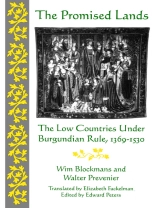They were, in the words of one contemporary observer, ‘the Promised Lands.’ In all of Europe, only Northern Italy could rival the economic power and cultural wealth of the Low Countries in the later Middle Ages.
In The Promised Lands, Wim Blockmans and Walter Prevenier trace the relations between the cultural and economic developments of the Low Countries and the political evolution of the region under the rule of the dukes of Burgundy. Combining political, diplomatic, administrative, economic, social, artistic, and cultural history, Blockmans and Prevenier have synthesized the most recent research on the subject—much of it their own—to produce the most accessible and authoritative book in English on the subject.
This is an updated and revised translation of a classic work first published in 1988, now expanded and reoriented toward a broader international readership.
Table of Content
Editor’s Note
Preface
The Dynasties of the Burgundian Low Countries
1. Perspectives on the Burgundian Dynasty in the Low Countries
2. A New European Power in the Making, 1363-1405
3. Burgundian Interests in France and the Low Countries, 1404-1425
4. The Decisive Years, 1425-1440
5. The Difficult Path Toward an Integrated State, 1440-1465
6. The Promised Lands, 1440-1475
7. War, Crisis, and a Problematic Succession, 1465-1492
8. The Second Flowering, 1492-1530
9. The Burgundian Legacy
List of Abbreviations
Notes
Bibliography
Index
About the author
Wim Blockmans is Professor of Medieval History at the State University at Leiden, Netherlands. Walter Prevenier is Professor of History at the State University of Ghent, Belgium.












